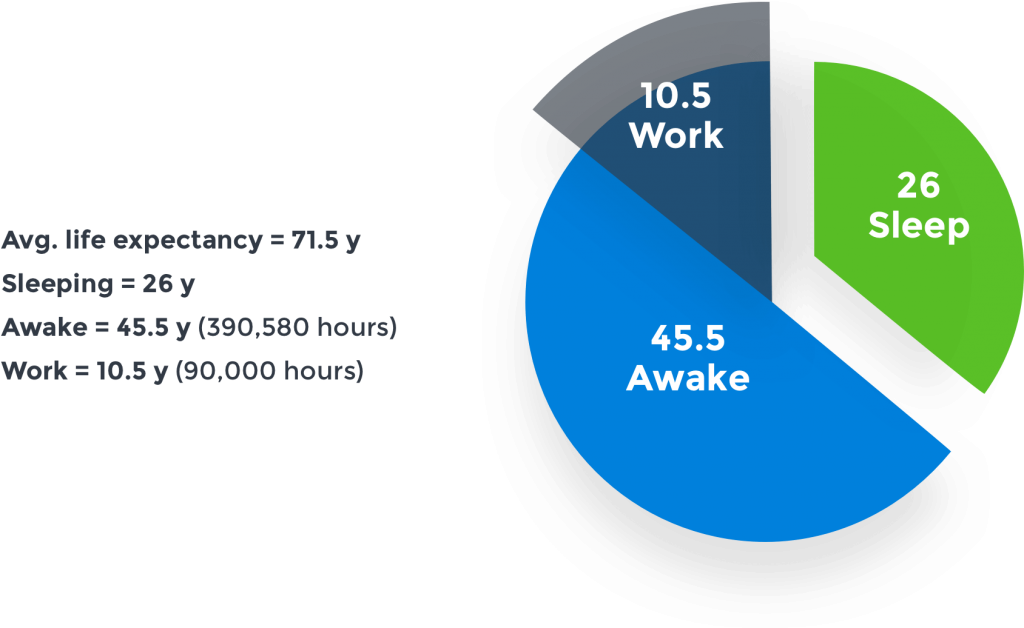“While things like beach vacations can give us pleasure, things like meaningful work can give us purpose.”
We spend a lot of time at work. Specifically, the average person spends 90,000 hours at work over the course of their lifetime. Let’s put that into perspective. The average global life expectancy is 71.5 years. We spend about 26 of those years sleeping, which means we’re awake for roughly 45.5 years, or 390,580 hours. That means we spend around 23% of our waking hours at work.

Meanwhile, 70% of people are miserable in their job. 90,000 hours is an awful lot of time to spend feeling down. Not to mention, the way you feel at work inevitably spills over into how you feel at home. Think back to the last time you felt particularly unhappy at work. Chances are, even when you left work for the day, your negative feelings came home with you. How you feel in the office ends up becoming how you feel in life.
Our feelings about work are especially important in customer support, where our moods have the potential to affect our customers. 92% of customers believe that an agent’s happiness at work affects their experience. And they’re right. Customer support employees provide higher-quality support when they’re happy at work.
Research has also shown that happiness at work increases productivity by 31% and boosts accuracy on tasks by 19%. Plus, it’s not just good for customers and businesses. It’s also good for the individual too. Happiness at work can lead to better performance evaluations and higher pay. It can also boost your immune system, making you more resistant to colds.
But amidst the stress and challenges of work, is it even possible to feel happy at work?
Many think of happiness as a sunny day on a beach, sipping on a tropical drink, far from work, without a care in the world. But that’s just pleasure, which is actually only one part of the happiness equation. Psychologist Dr. Sonja Lyubomirsky describes happiness as “the experience of joy, contentment, or positive well-being, combined with a sense that one’s life is good, meaningful, and worthwhile.”
As it turns out, happiness is a combination of pleasure and purpose. While things like beach vacations can give us pleasure, things like meaningful work can give us purpose.
 Happy is as happy does
Happy is as happy does
Much of Dr. Lyubomirsky’s work is in positive psychology, a whole branch of psychology dedicated to studying how people can become happier and more fulfilled. And as counterintuitive as it may sound, happiness is, in part, a discipline — a thing that can be practiced. In her book, The How of Happiness, Dr. Lyubomirsky reveals that a solid 40% of our happiness depends on our intentional activities. Intentional activities are purposeful steps we take to improve our situation.
In customer support, there’s a lot of very simple activities we can use to become happier. Here are six activities that can make you go to work happy.
1. Use your vacation time
Days on the beach to relax and unplug are important for your well-being. Yet millions of vacation days go unused each year. Your vacation time is part of your overall compensation. Rather than feeling guilty about taking time away, remember that pleasure is a crucial component in happiness.
Many people assume that being more visible at work increases their chances or promotion or recognition, but working 12-hours every day of the workweek is just going to burn people out and drop their productivity.
Time off is a tricky thing. You may not feel like you can take time off, or feel like you’re letting down the team even if you have tons of vacation time saved up. But vacations have been proven to increase your productivity. When it comes to both your personal happiness and your happiness at work, vacations are a win-win. Along with the benefit to your business, time off relieves stress for you and can actually increase your creativity. Some companies even require their employees to take time off.
Vacation is a great way to catch up on sleep, shift your perspective, reinvigorate your sense of focus, and spark creativity by seeing new things. Take regular, longer-than-2-day vacations, and you’ll find yourself more excited and happy.
2. Optimize your office
Your physical environment has a measurable impact on how you feel, so show it some love. Personalizing your desk space can improve your well-being. Decorate with your favorite items and make your space your own. While you’re at it, put out a few plants. They’re not just pretty to look at they can increase your job satisfaction and overall life quality.
3. Walk it out
Exercise has a host of benefits, including making us happy, and all it takes it 20 minutes. Try a light morning routine, walking to or from work, or going around the block on your lunch break.
4. Flip the script
In his book, The Happiness Advantage, Shawn Achor advises, “The mental construction of our daily activities, more than the activity itself, defines our reality.” Take one of the most common activities we engage in as support professionals, answering a customer inquiry. You could think of it as just work. Or you could think of it as an act of kindness, which is one of the most powerful ways to increase happiness.
As support professionals, we sure are lucky to have tons of opportunities to do acts of kindness every day. Not only does this make us happier, but a study by American Express also found that receiving great customer service triggered the same reactions in the brain as feeling loved.
5. Say “thank you”
People who practice gratitude report a host of benefits, including higher levels of positive emotions. This can be as simple as taking a few minutes each day to think of a few things that you’re grateful for. You could write them down in a gratitude journal or write thank you notes to people who have helped you recently. There are tons of ways to practice, and none of them are difficult.
Support agents also like to know that the work that they do is seen and recognized as valuable. In fact, we are 90% more engaged with the company and team when there is a formal recognition system in place, versus when there is not.
If your company doesn’t have a process for providing recognition and constructive or positive insights, it is a huge opportunity that will prove valuable for keeping team members aligned and happy.
This could be anything from formalized feedback during one-on-one meetings to a company-wide Slack channel where excellent performance is shouted out in a message.
Similarly, you can also encourage your coworkers to provide recognition for others—this promotes a boost in camaraderie and support that can be valuable moving forward.
6. Find your friends
Employees who have friends at work see their jobs as more fun, enjoyable, worthwhile, and satisfying. Get to know your coworkers. Say “hello” in the morning and take an extra five minutes to chat in the hallway. Try to get coffee or lunch on a regular basis. Work with your manager to plan a team-building day. All of these activities can help you make connections with your fellow employees and lead to friendships that will greatly contribute to your happiness at work.
Connections with others at work reduce feelings of isolation and loneliness and also add to increased happiness at work. Happier employees mean a more positive environment, which leads to higher productivity.
 Happiness isn’t everything
Happiness isn’t everything
While happiness is certainly important, it doesn’t make you invincible. As it happens, extremely positive people aren’t as good at empathizing with people who are recounting a negative experience. That’s a pretty important skill for customer support professionals. So, if you’re a naturally sunny person, it could mean you need to work a little harder to consider how your customers are feeling.
There can also be a lot of pressure to be happy at work or “crushing it”. Especially if you work in a fast-paced startup, you might find that it’s difficult to take time to work on your mental well-being, or even raise issues around work-life balance. This can lead to burnout if left unchecked.
Feeling overwhelmed and burnt out can happen to anyone. Being more and more connected to work through apps and email may mean you never fully feel like you’re “off.” Outside of the negative effects on you, burnout also impacts your business. Productivity goes down and you may start considering leaving due to the stress.
Experts recommend a balanced approach to emotions at work.
Happiness is simply one of our many emotions, and it’s not reasonable to expect or strive to be happy all day, every day. Negative sentiment is necessary, even beneficial in some circumstances. It can help us empathize with our frustrated customers even more strongly.
It’s important to recognize that happiness needs to exist in harmony with, not replace, our other emotions.
Note that there’s a difference between mild dissatisfaction in your work and depression. It’s nice to try to be happy at work, but sometimes it takes more than just a clean desk and exercise to feel better. If you have persistent negative feelings that interfere with your work or daily life; constantly feel tired, worthless, or hopeless; or have other symptoms of depression, seek help.
Depression can be treated and your mental health is important – much more important than crushing the queue 24/7.
 You are a priority
You are a priority
Engagement and excitement on the team may sometimes take a back seat to metrics like NPS, CSAT, or first response time—but they are just as, if not more important, for the ongoing health of you and happiness of customers.
That said, I’m betting that most of us aren’t running the risk of being too happy at work anytime soon. If you want to be happier at work, take action!
If you don’t feel valued and supported at work, then it may be time to leave. When your boss routinely makes demands of you during your vacation time or time off, lead through fear, or if you’re shunned for making reasonable requests to improve your workspace and workflow, then it’s highly likely you’re not working in an environment that’s conducive to your welfare. You’ll be much better off elsewhere.
If you’ve got a supportive environment, then happiness at work is well within reach. Aside from the techniques mentioned, there’s a whole world of happiness research out there. There’s bound to be a few activities that are effective for you.
The name of the game is to prioritize and actively try to bring happiness into your work so you can be a more effective professional, reap the personal benefits of happiness, and enjoy more of your time…all 90,000 hours of it.









